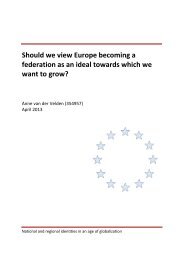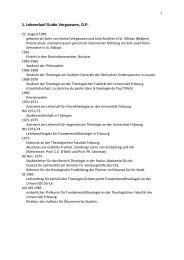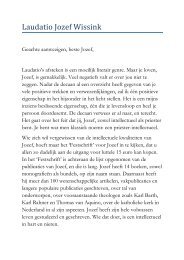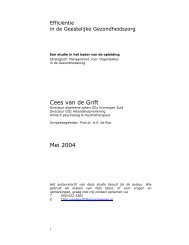Here - Tilburg University
Here - Tilburg University
Here - Tilburg University
You also want an ePaper? Increase the reach of your titles
YUMPU automatically turns print PDFs into web optimized ePapers that Google loves.
Presenter<br />
Liebig, Stefan; <strong>University</strong> of Bielefeld<br />
Authors<br />
Stefan Liebig and Carsten Sauer; <strong>University</strong> of Bielefeld<br />
Katrin Auspurg, and Thomas Hinz; <strong>University</strong> of Konstanz<br />
Title<br />
Just gross earnings: Why respondents prefer lower inequalities in earnings while<br />
an inter-viewer is sitting next to them.<br />
Abstract<br />
The factorial survey design has become a popular method in survey<br />
research. It integrates experimental set-ups into a survey: Respondents react to<br />
hypothetical descriptions (vignettes) while the values of each attribute<br />
(dimen¬sion) systematically vary in order to estimate the impact of each<br />
dimension on respondents' judgments. So far there is only little empirical<br />
knowledge if and to what extent this approach causes methodological artefacts<br />
especially in attitude research. Using the example of justice evaluations of gross<br />
earnings we address two methodological problems in this paper. First, as<br />
respondents have to evaluate a number of complex descriptions (vignettes of<br />
fictitious earners) the complexity may result in quite arbitrary reactions, varying<br />
from time to time and causing a very low reliability of the instrument. Second,<br />
as the factorial survey was designed for an indirect measurement of attitudes<br />
one of its advantages is seemingly a low sensitivity for social desirability<br />
response sets. Therefore we present two studies focusing (1) on the reliability of<br />
attitude measures using a test-retest design (three wave panel study, 2008) and<br />
(2) on the sensitivity for interviewer effects using a mixed mode design (German<br />
population survey, 2009). The results based on the student panel study show a<br />
fairly high reliability of the attitude measurement. In the population survey we<br />
find strong interviewer effects, meaning that the perceived just magnitude of<br />
income inequality is more egalitarian in the presence of an interviewer than in<br />
the absence of an interviewer. We discuss the latter from a methodological but<br />
also from a substantial point of view as it is in line with the experimental findings<br />
from behavioral economics and an evolutionary theory of justice attitudes.

















